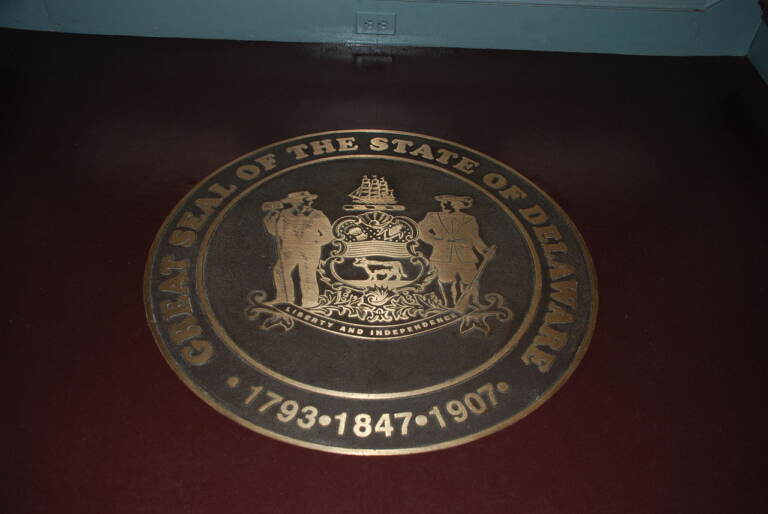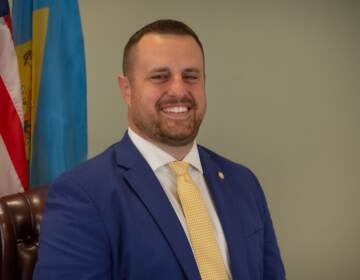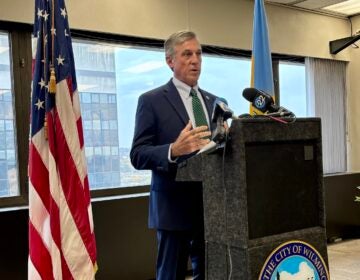Delaware lawmakers start third year of pandemic-limited meetings in Dover
With COVID-19 case numbers soaring, the Delaware General Assembly will regroup in Dover for the start of a hybrid of in-person and virtual meetings.

Delaware Legislative Hall state seal (Wikimedia / Adavyd)
Lawmakers are back at work in Dover this week, resuming the second half of their 151st session. Just like last year, the pandemic will force a mix of in-person and virtual meetings.
“While I miss the normal activity of Legislative Hall, ensuring the health and safety of legislators, staff and the public is a top priority,” said State House Speaker Pete Schwartzkopf. “The work of the General Assembly is critical, and we want to reduce the chances of an outbreak, which could potentially cripple the operations of this branch of government.”
Lawmakers traditionally meet at Legislative Hall Tuesday through Thursday, with Wednesday’s session focused mainly on committee hearings. But because of the huge spike in coronavirus cases, they’ll start this year’s session meeting in person only on Thursdays to vote on bills. Committee hearings will be held virtually on Tuesdays and Wednesdays.
“I think every one of us had hoped the pandemic outlook and the format of our legislative session would be different this January, but the sudden spike in COVID cases combined with the highly contagious nature of the omicron pandemic demands that we take steps to protect our continuity of governance,” said Senate President Pro Tempore David Sokola.
It’s not clear how long the virtual/in-person rules will be in place.
“My sincere hope is we can revisit these policies later in the year, but for now we all need to make decisions that protect the health and welfare of our guests and employees,” Sokola said.
Some of the legislation expected to be debated between now and the end of the session on June 30 will likely be influenced by the pandemic. That includes bills like Sen. Sarah McBride’s paid family leave measure.
“As we’ve all seen throughout the pandemic, we cannot have a thriving economy if we don’t take care of our health. Paid leave allows people to get the lifesaving care that they need,” McBride said. “It enhances access to caregivers that improves outcomes, and it pays dividends long term in the social and emotional development of children.”
In addition to new parents and family caregivers, the bill would provide paid family leave to victims of domestic violence and families impacted by military deployment. Delaware state employees already get paid family leave.
State Rep. Ed Osienski has another COVID-related bill that would extend a provision of unemployment payments so recipients will not have to pay state taxes on the benefits they received during the continuation of the pandemic into 2021.
Schwartzkopf is also sponsoring legislation that would make to-go alcohol sales permanent. Lawmakers allowed cocktails-to-go on a temporary basis during the start of the pandemic in 2020 to help bars and restaurants. The bill would also make permanent the temporary permission for restaurants to expand outdoor dining.
“While the pandemic has been extremely challenging for families and businesses across the state and country, it also has forced us to get creative at times. Restaurants and bars were among the hardest-hit industries these past two years, and we had to use some ingenuity to provide assistance,” Schwartzkopf said. “These innovations are about to expire, but even as this health crisis continues, it’s clear that there is a market and a desire for these practices to continue for good.”
Advocates for stronger police accountability are expected to make a push again this year to amend the state’s Law Enforcement Officer’s Bill of Rights. That effort to make police discipline records public brought civil rights leader Al Sharpton to Dover in November. He pledged to be back to the state capital “with numbers” if needed to get that measure passed.
State revenue is expected to be higher than originally thought in the next fiscal year. That means lawmakers will have more money to spend as they craft the FY 23 budget. The Delaware Economic and Financial Advisory Council, which officially sets revenue estimates for the budget, says the state will bring in $400 million more in the current fiscal year than it originally estimated in June. The group credits the revenue bump to increased personal and corporate income tax payments.
Gov. John Carney will present his budget plan at the end of the month.
WHYY is your source for fact-based, in-depth journalism and information. As a nonprofit organization, we rely on financial support from readers like you. Please give today.






